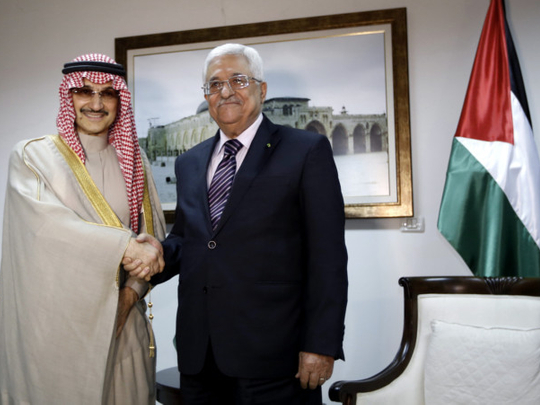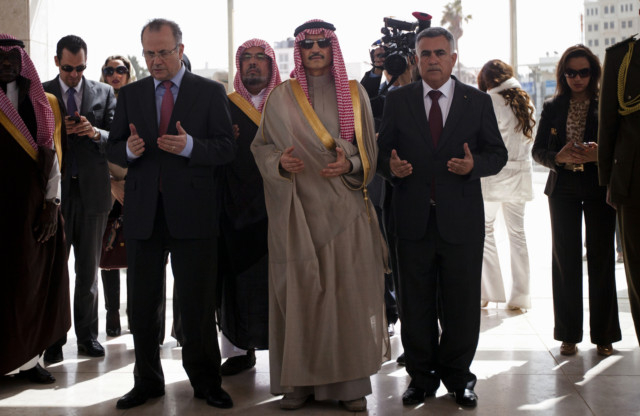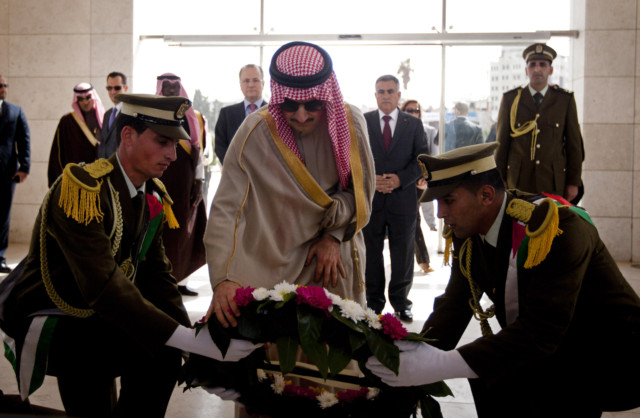
Ramallah: Plans for the visit of the Saudi billionaire Prince Al Waleed Bin Talal to the West Bank were changed at the last minute after the prince refused to enter the West Bank through an Israeli-controlled border crossing. According to Palestinian officials in Ramallah, Al Waleed was due to cross the Shaikh Hussain crossing, locally known as Al Karamah, to make a historic trip to Ramallah as the first Saudi ruling family member to visit the West Bank in modern times.
The prince however refused to use the land crossing as it is controlled by the Israeli occupation.
Jordan subsequently provided the prince with a helicopter so he could be taken directly to the Palestinian Presidential Headquarters, the Mukataa, in Ramallah for his several hour long visit instead of going by land.
Al Waleed has previously visited the Gaza Strip twice.
A senior Palestinian official told Gulf News that the Palestinian leadership was informed about the Prince’s refusal to enter the Palestinian territories via the road crossing at the last minute and that the air alternative was offered by the Jordanians to make the visit possible.
The cooperation of Jordanian authorities played a central role in coordinating the Prince’s air travel with the Israeli authorities that occupy the West Bank and control its entry and exit points.
Officials from the Palestinian National Authority (PNA) had originally coordinated the Prince’s visit with the Israelis, but on learning that the Shaikh Hussain is an Israeli-controlled crossing, Prince Al Waleed refused to go through the necessary entry procedures despite a Palestinian pledge that an official Palestinian delegation would meet the Prince at the crossing to complete all official procedures.
Saudi Arabia does not recognise the Israeli regime and does not engage in any contact with it.
The Israelis however also control the airspace over the West Bank, and it is likely that Jordan coordinated his entry with the occupation authorities, with whom it has signed a peace treaty.
“We secured Israeli permission for Prince Al Waleed to enter the [occupied] Palestinian territories. As soon as his name was mentioned to the Israelis, the initial approval for the visit was secured,” said the official.
“It would have been extremely embarrassing for the Israelis to reject an entry permit for Prince Al Waleed and we had Israeli pledges that the prince would not be searched at all and that he would be treated with the utmost respect on the crossing. The Israelis promised they would treat the Prince in an extraordinary way,” he said.
“The Prince, however, refused all those preparations and demanded to fly to Ramallah. On arrival at the airfield of Al Mukataa, Prince Al Waleed laid a wrath of flowers at the grave of the former Palestinian iconic leader Yasser Arafat.”
“Prince Al Waleed then moved to Movenpick Hotel where he met Palestinian business people.”
“Later the Prince was to visit Al Ersal Centre in Ramallah before returning to Al Mukataa where he was scheduled to meet with the Palestinian President Mahmoud Abbas.”
“During the meeting, the President was to decorate the Prince with a significant Palestinian medal.”
After visiting some neighbourhoods of Ramallah, including Al Tira, Prince Waleed Bin Talal was to leave Ramallah for Jordan in the Jordanian helicopter.
“There have been several reservations about this kind of visit from the Saudi side,” said the Palestinian official, adding that “this was a very important visit for all Palestinians as such a visit will encourage other Saudi and Arab business people to visit the West Bank.”
“A visit to a prisoner does not mean in any way normalisation with the jailer, but it is meant to demonstrate support and solidarity with the prisoner,” said the official. “Prince Al Waleed is a prominent international figure and this visit has significant political, social and economic dimensions,” he said.
The official said that the visit delivers a clear message that the Palestinians remain an integral part of the Arab and Muslim worlds and that the Arabs are fully aware of the Palestinian suffering under the Israeli occupation.














